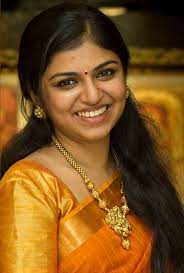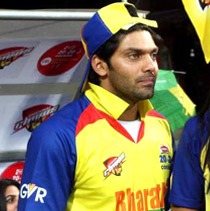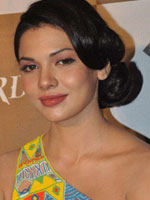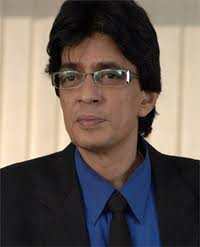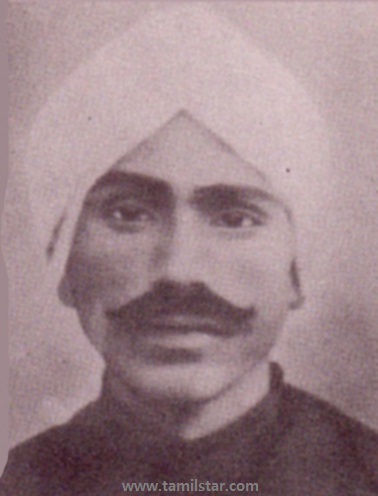
Showing all artists born in December 11
Raveena Ravi
Raveena Ravi is an Indian voice actress. She was born to voice actor Sreeja Ravi and Actor/Singer Ravindranathan Krishnan. She started her career at the age of 2 for Thotta Chinungi (1995). She has dubbed several television advertisements directed by Rajiv Menon in Tamil, Telugu and Malayalam. She started dubbing for lead female actresses with Saattai (2012). She debuted as an actress on-screen with Oru Kidayin Karunai Manu.
Known For:
Veeramae Vaagai Soodum
, Rocky
Arya
Arya (born as Jamshad on 11 December 1980) is an Indian film actor who mainly appears in Tamil films. He is best known for his roles in the films Pattiyal (2006), Naan Kadavul (2009), Arinthum Ariyamalum, Madrasapattinam (2010), Boss Engira Bhaskaran (2010) & Vettai (2012).
Arya was born on 11 December 1980 in Trikarpur, Kerala, India into a Malayali Muslim Dhobi family. He has a younger brother, named Sathya and Razi, who is studying. He graduated with an engineering degree from Crescent Engineering College, based at Vandalur, Chennai, Tamil Nadu, India. He did his schooling in SBOA Matriculation and Higher Secondary School, Chennai.
Arya was born on 11 December 1980 in Trikarpur, Kerala, India into a Malayali Muslim Dhobi family. He has a younger brother, named Sathya and Razi, who is studying. He graduated with an engineering degree from Crescent Engineering College, based at Vandalur, Chennai, Tamil Nadu, India. He did his schooling in SBOA Matriculation and Higher Secondary School, Chennai.
Known For:
Sangamithra
, Kadamban
, Bangalore Naatkal
, Size Zero
, Meaghamann
, Inji Idupazhagi
, Arjun, Divya Matrum Karthik
, Yatchan
, Thaakka Thaakka
, Vasuvum Saravananum Onna Padichavanga
, Purampokku Engira Podhuvudamai
, Meagamann
, Chandra
, Irandam Ulagam
, Arrambam
, Raja Rani
, Settai
, Oru Kal Oru Kannadi
, Vettai
, Avan Ivan
, Chikku Bukku
, Boss Engira Bhaskaran
, Kaadhal Solla Vandhen
, Madrasapattinam
, Sarvam
, Siva Manasula Sakthi
, Naan Kadavul
, Oram Po
, Maya Kannadi
, Vattaram
, Pattiyal
, Kalabha Kadhalan
, Oru Kalluriyin Kathai
, Ullam Ketkumae
, Arinthum Ariyamalum
Sara Loren
A new girl in the B-Town, Mona Laizza a.k.a Sara Loren is a Pakistani actress who is famous for working in Pakistani television serials and Lollywood films. The leggy lass is a successful model too. Mona was born in an orthodox Muslim family. She originates from Kuwait where she completed her education. But after the sudden death of her father, she and her entire family shifted to Pakistan where she got a first break of her career.
She made her acting debut with a Pakistani television serial. After that she has worked in many Pakistani television serials and 2 Pakistani movies also. She also performs with the group of Pakistani artists in various countries. She has also worked as a theatre artist in Delhi and in Karachi too.
In the year of 2010, the beautiful actress made her Bollywood debut with the film 'Kajraare' also starring Himesh Re... See full bio
She made her acting debut with a Pakistani television serial. After that she has worked in many Pakistani television serials and 2 Pakistani movies also. She also performs with the group of Pakistani artists in various countries. She has also worked as a theatre artist in Delhi and in Karachi too.
In the year of 2010, the beautiful actress made her Bollywood debut with the film 'Kajraare' also starring Himesh Re... See full bio
Known For:
Raghuvaran
Raghuvaran was an Indian actor who predominantly acted in movies made in South India. He became famous for his portrayal of villain and character roles in Tamil films. He has acted in more than 150 Malayalam, Tamil, Telugu, Kannada and Hindi films. According to the Hindustan Times, "The actor had carved a niche for himself with his special style and voice modulation."
He played the protagonist of a Tamil soap opera, Oru Manidhanin Kadhai, about a well-to-do man who becomes an alcoholic. He received critical acclaim for his role as Father Alphonso in the Malayalam movie Daivathinte Vikruthikal, directed by Lenin Rajendran and based on M. Mukundan's novel of the same name.
He was born in 1958 at Kollengode in Palakkad district, Kerala. He was the grandson Mr. N. Radha Krishna Menon and Satyavathy Amma and son of Velayudhan ... See full bio
He played the protagonist of a Tamil soap opera, Oru Manidhanin Kadhai, about a well-to-do man who becomes an alcoholic. He received critical acclaim for his role as Father Alphonso in the Malayalam movie Daivathinte Vikruthikal, directed by Lenin Rajendran and based on M. Mukundan's novel of the same name.
He was born in 1958 at Kollengode in Palakkad district, Kerala. He was the grandson Mr. N. Radha Krishna Menon and Satyavathy Amma and son of Velayudhan ... See full bio
Known For:
Ellam Avan Seyal
, Yaaradi Nee Mohini
, Bheemaa
, Marudhamalai
, Sivaji
, Deepavali
, Sivappathigaram
, Sachein
, Jananam
, Arasatchi
, Aajaneya
, Anjaneya
, Thirumalai
, Alai
, Kadhal Virus
, Maaran
, University
, Roja Kootam
, Red
, Dhaya
, Majunu
, Star
, Uyirile Kalanthathu
, Parthen Rasithen
, Kandukondain Kandukondain
, Vallarasu
, Sudhandhiram
, Kannukkul Nilavu
, Iraniyan
, Mudhalvan
, Amarkalam
, En Swasa Kaatre
, Iniyavale
, Thulli Thirintha Kaalam
, Aahaa
, Ratchagan
, Nerrukku Ner
, Abhimanyu
, Ullaasam
, Love Today
, Arunachalam
, Selva
, Thotta Chinungi
, Muthu
, Kolangal
, Nadodi Mannan
, Raja Muthirai
, Baashha
, Kadhalan
, Captain
, Paasamalargal
, Pudhiya Raagam
, Puriyaadha Pudhir
, Anjali
, Raja Chinna Roja
, Siva
, Nilaave Vaa
, Thaimel Aanai
, Poovizhi Vasalile
Subramania Bharati
Chinnaswami Subramania Bharati (11 December 1882–12 September 1921) was an Indian writer, poet and journalist, and Indian independence activist and social reformer from Tamil Nadu. Popularly known as "Mahakavi Bharati", he was a pioneer of modern Tamil poetry and is considered one of the greatest Tamil literary figures of all time. His numerous works were fiery songs kindling patriotism and nationalism during the Indian Independence movement.
Born in Ettayapuram of Tirunelveli district (present day Thoothukudi) in 1882, Bharati had his early education in Tirunelveli and Varanasi and worked as a journalist with many newspapers, notable among them being the Swadesamitran and India. Bharati was also an active member of the Indian National Congress. In 1908, an arrest warrant was issued against Bharati by the government of British In... See full bio
Born in Ettayapuram of Tirunelveli district (present day Thoothukudi) in 1882, Bharati had his early education in Tirunelveli and Varanasi and worked as a journalist with many newspapers, notable among them being the Swadesamitran and India. Bharati was also an active member of the Indian National Congress. In 1908, an arrest warrant was issued against Bharati by the government of British In... See full bio
Known For:

